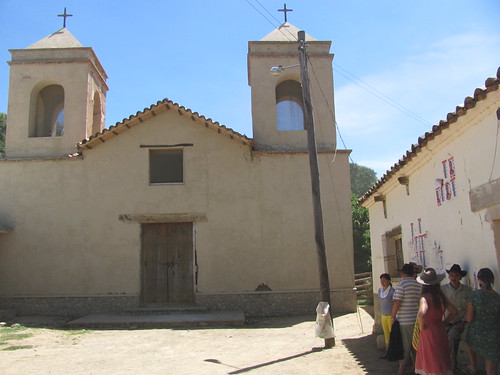Tarija is a rather lovely department of Bolivia. The climate is nice, ideal for growing all year around: figs, grape vines, basil, fennel. Turn on the radio and an adorable child voice serenades the cows of Tarija.
We´ve been working with Mauricio, who has been to France and Italy, where he worked as a wwoofer himself and studied food. He´s not much of a cook, but he prepares pesto, escabeche, smokey salt, eggplant salsa, limoncello, and various other artisan products. A quick learner, full of ideas; I hope he doesn´t lose his enthusiasm.
Already we taught him how to make bread, introduced him to hummus, and invented a few recipes like fig salsa for him to try out. First thing he asked us to do was tear up the dirt out front and make an example garden. We planted radish and lettuce. Mauricio knows he won´t get much out of this plot, but he is excited to be an advocate for the home garden and the organic technique.
We mentioned that we had written to an organic wine producer in the area; Mauricio was able to arrange a visit. It happened that he was giving a class that began 7 months prior, and was ending on what was the last day of summer here. He had hung up two pig legs in the wine cellar at the organic vineyard, Valle D´Vino, and invited us to come down for the cutting-of-the-ham. We biked through the rolling hills on a hot Saturday to meet him.
Pulling out the moldy legs of the chancho was fun. Every vegetarian has a bacon phase, so I had no hesitation about trying the two hams (ok, I´ve eaten enough meat in the last year that I can´t throw the word vegetarian around. So far in south america though, if you don´t have meat on your plate at any given moment, you´re assumed veggie.) It was tasty. Courtney didn´t try it, her willpower knows no end. Everyone she´s met has taken it upon themselves to try to convert her to carnivore, but she holds strong.
We stayed the night, bunking with a wwoofer from Arkansas on the vineyard. In the morning we woke up and chatted with the landholder, Don Jesus Romero, about the feria del queso. He agreed that we should go, and offered to take us there. First things first though. They brought a cow around and got the sugar, singani (grappa), and a few glasses. A spoonfull of sugar, a dash of singani, place your glass below the udder, stir: that´s ambrosilla, delicious, filling, and a genuine surprise that we´re not likely to forget.
The feria del queso was fun, but better yet was the chance to be carried along by a landed gentleman who introduced us around and paid our way. He tried to show us the oldest church in Tarija, but they couldn´t find the key, so we had to make do with delicious cheeses. There isn´t much variety, but the cheese is miles beyond the poor excuses, deceptively labeled with recognizeable names that we found in Argentina, most of which turned out to be somewhere between colby and cream cheese, carrying varying amounts of salt. The festival promised to turn into a good revelry, as the Tarijeños drink plenty of wine and chicha, and they had a load of saddled horses and cows on hand, but we took off early so we could bike back to the city of Tarija in daylight.
We took a bottle of organic cabernet for the road, as we have been abstaining (save a few drops of singani to cleanse the raw milk, and the touch of many wines to our lips for taste) as an experiment in purification. This and a bottle of quinoa beer that we´re still searching for could destroy us if we´re at 4,000 meters when we open them after 6 weeks without. Riding a bike through wine country is always rewarding. I especially like coasting at speed, watching vine rows perpendicular to the road pass by.
While we haven´t actually had a ton of work, we´ve kept busy meeting people for dinner and tea, thanks to our amiable host. And as the elections are coming up, which are obligatory, politics keep coming up. I was at first excited to be learning something new, but it seems the same old story: government poorly managing funds; foreign or nationalized corporations taking all the natural resources and earnings; inequality and resentment between the indeginous ¨campesinos,¨and the whit(er) skinned folk. Well, we´ve been getting plenty of practice speaking spanish.
They say the internet is faster in La Paz, maybe we´ll be able to upload some more photos there. In the meantime, we´re getting nearer the Bolivian border at flickr.com/photos/jellofallacy
Wednesday, March 24, 2010
Subscribe to:
Post Comments (Atom)






No comments:
Post a Comment